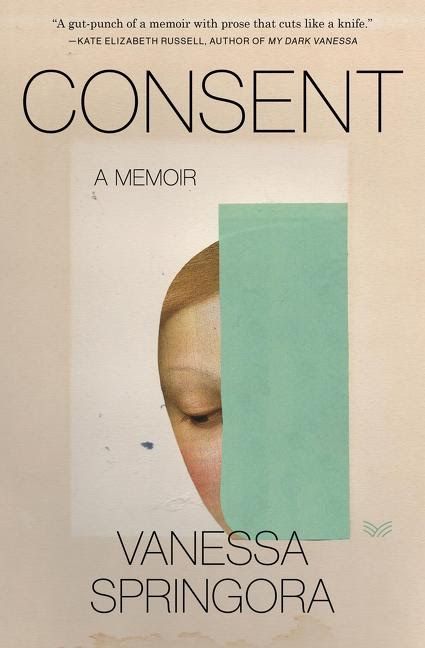by Sara Krolewski
The word “interminable” appears at various intervals throughout Natasha Lehrer’s new English translation of Consent (Le consentement), a memoir by Vanessa Springora. Springora, now the head of the French publishing house Éditions Julliard, recalls “interminable” courses at a bourgeois dinner she attended as a thirteen-year-old, where she first caught the eye of “G.M.,” a fêted, middle-aged French writer. There is the “interminable” pain of a prolonged stay in the hospital, where a psychoanalyst suggests that her suffering might be psychosomatic—stemming from her now sexual relationship with G.M. And then there is the “interminable succession of marvelous sexual initiations” that G.M. depicts in his writing: the parade of young girls who, like Springora, flit in and out of his Paris apartment, all the while becoming fodder for his popular novels and essays.
It’s an apposite word to recur in this book, which recollects Springora’s experiences with G.M., alias Gabriel Matzneff: one of France’s most well-known contemporary authors and the subject at the center of a scandal that has engulfed nearly every level of the French elite. Matzneff’s career has drawn to a close—he is facing five years in prison for charges of child sex abuse—but Springora suggests that her own life will always be a kind of purgatory. In the 1970s and 1980s, Matzneff groomed and abused countless children and teenagers, including Springora. Such behavior was more or less accepted as a fact of life—and the right of eccentric artists to exercise—in the post-sexual revolution years. (“Any eccentricity or freakishness or flaunting of the rules will be tolerated in France if it should emerge in an intellectual who compels admiration,” the journalist Vivian Gornick has written.) Unusually, Matzneff wrote openly about his predilections for the underaged, and was protected from retribution by an obliging upper class: government officials, members of the literati, even the police. Now, with the publication of Springora’s book (released in France last year), a harsh light has illuminated decades-long practices of corruption in the publishing world and Paris government, and inspired investigations into other public figures. What began as an isolated probe has led to a new wave of #MeToo-esque allegations and testimonies in France—a country whose deference to literary stars has not always extended to feminists and activists.
In his books, Matzneff left an indelible trail looping back to Springora: pointed references to a “Vanessa,” or “V.”, who obsessed him. (“I remember kissing Vanessa on the rue Suger, she pressed against the wall, me tight against her, just a few meters away from the entrance to her school,” he writes in Boulevard Saint-Germain, from 1998.) After his arrest, publishers severed ties with Matzneff, but the books remain available. This literature shackles Springora to the past: “…for me it was like an earthquake, an invisible tremor that upended the very foundations of my life, a blade plunged into a wound that had never scarred over.” Here, a rejoinder is offered to the common question: Can’t you just move on? Truthfully, we rarely move past early, formative moments of pain. Difficult memories, unless profoundly repressed, linger in desultory forms. And if those moments are violent or coercive, they tend to defy our best efforts at containment—becoming ineffable, and more painful for remaining unexamined.

Consent, like many recent works that might be classed as “#MeToo memoirs,” puts language to the untreated wound. Among them are Chanel Miller’s Know My Name (2019), Tanya Selvaratnam’s forthcoming Assume Nothing, and Carmen Maria Machado’s In the Dream House (2019). These are books that attempt to document sexual violation, formalize an accusation (or several: Springora condemns both Matzneff and the literary establishment that protected him), and free the image of the victim from media or legal portrayals. They are part evidentiary—committed to revealing the truth of an experience, and vouching for the victim’s credibility—and part inquisitive: their authors often seem to be grappling with the very notion of violation, and what it means to remember and write a story of trauma. (“Trauma provides a special way of moving through time,” Miller writes in Know My Name. “Years fall away in an instant, we can summon terrorizing feelings as if they are happening in the present.”) If these descriptions sound prescribed, that’s because the books tend to be the same.
To some critics, though, they are simply “brave,” a qualifier that edges out any consideration of literary merit. (“Devastating,” “powerful,” and “necessary” are often tacked on as vague accompaniments.) To launch an accusation against a public figure—an Olympics-bound swimmer, an esteemed writer, a New York attorney general—is an arduous, courageous feat. To write a book memorializing the incident takes fortitude, but certain accommodations—a large advance, a coaxing editor—ease the burden of the task.
Whether or not these authors are in fact exercising bravery depends entirely on the context. But—if we just consider their literary value—it is also beside the point. Memoirs can be slight and underdeveloped, concealing murkier truths; equally, they can be turgid and affected, or so tightly controlled as to leave nothing open to interpretation. There are formal elements to be considered and configured: Will the story be chronological? How will other voices feed in? What parts should be trimmed away? The content of a memoir doesn’t preclude our analysis of it, though we are often compelled to feel otherwise. As Amber Frost writes in The Baffler about narratives of sexual violence: “As readers, we are mostly encouraged to sit unquestioningly through this act of remembrance, pained and moved by its gut-wrenching reason for being.” Memoirs, especially #MeToo memoirs, occupy a fraught position in the literary world. Often imagined to be beyond critique, these memoirs can also be sclerotic, lacking needed depth. As readers, we feel “pained and moved,” and appropriately reverent. We may also feel stifled and unsatisfied, even if we can’t quite articulate those feelings.
Springora is more invested than most memoirists in the freighted dimensions of the literary. She is an editor, embedded in the literary world (and in France, much more than the United States, that’s a position that confers status, if not outright celebrity). Her story with Matzneff unfolds in the same world. Though the two rarely discuss his writing—he warns her against reading his books, filled with accounts of his relationships with other young women, though she eventually does—she is captured by his “manipulation” of language, apparent in his writing as well as his speech: “With the simplest expression he could deal me a fatal blow.” Matzneff introduces her to his circle of elite literary friends, who initiate her into their blowsy-chic salons and dinners. (Again, we’re reminded that French culture—especially in the post-Mai 68 years—differs substantially from American culture: no one bats an eye at Springora’s relationship with Matzneff.) And it is books, Springora tells us, that violated her, as much as Matzneff: “Today, I view books with suspicion. A glass wall has been erected between them and me. I know they can be poison.” This is because the Vanessa whom Matzneff wrote about bears no relation to Springora herself. His “V.” is a fabrication used to serve his own narrative, “a grotesque, contorted snapshot” whose permanence, and shadowy imprecision, rankle.
Yet in this curiously flattened, sometimes affecting memoir, Springora herself proves adept at contortion. Consent trims away too much, fashioning a story that acknowledges—but never deeply or coherently engages with—its own challenging material. With the exception of Matzneff, a necessarily ambiguous figure—seductive and cruel in equal measure—its characters are half-formed, elliptical but not intriguing. Mostly, they’re enemies, determined to injure her: schoolyard bullies, callous friends of Matzneff, and especially Springora’s mother, who pawns her off to Matzneff with an air of resignation. True friends or allies are in short supply. Is this plausible?
The injuries begin in childhood. Her parents divorce early on; she is the object of scanty affections from a mercurial mother, a distant father. There is also her “sexual precocity”: grasping encounters with other young friends, inspired by the primal scenes she witnesses (accidentally, though with great curiosity) between her parents and their lovers. Indeed, the first part of Consent reads like a Freudian case study, replete with sexual stirrings and parental estrangement. As much as Springora wants to resist tidy narratives of victimization—“I wasn’t yet done with ambivalence,” she writes, after her therapists explain that she isn’t to blame for the abuse—the story she tells aligns with standard notions of what a victim should be: precocious, susceptible, already damaged. Springora glosses over the aspects of her story that don’t quite fit this narrative. For example, her mother’s initial suspicion toward Matzneff—which Springora reads as jealousy, without offering compelling evidence—leaves the reader to wonder about the real complexities of their mother-daughter relationship.
Most jarring is Springora’s tendency to universalize her own experiences. “All the necessary elements were now in place,” she notes before her first meeting with Matzneff—suggesting that abusers target one kind of victim. But predators thrive on disorder, on accruing power wherever the opportunity presents itself; anyone, of course, can be a victim. This is a dark, difficult truth, especially if we are accustomed to looking for patterns, and one that Springora—poring over her years with Matzneff, marveling at his power and cunning—seems at times to understand. “His desire for me had been repeated an infinite number of times [and] was pathetically banal,” she writes, referring to Matzneff’s encounters with other children and adolescents. We’re left with what amounts to a muddled account of their relationship. Perhaps the abuse was targeted, tailored to the vagaries of Springora’s life: Matzneff was drawn to her curiosity and preternatural gifts. Or was she just one victim of hundreds, another easy capture? As Springora says to another one of Matzneff’s victims in an unexplained flash of sympathy, perhaps “he didn’t even mean” to exploit them: it could have been his “pathology” that compelled him. In these moments, the complexity of the situation overruns itself, becoming dense and unmanageable.
It’s not that Springora has to have all of the answers, but even the questions aren’t clearly, or meaningfully, addressed. Is it that she wants to decode Matzneff—to “ambush him within the pages of a book” and trap him there for observation? Is it the pathology of victimization, and the difficulty she has faced in coming to terms with her own victimhood, that she wants to articulate? Springora’s prose knots these subjects together, as if to secure them—shielding the story at hand, as well as the younger version of Springora whose life is in question. But how can a reader begin to disentangle the ideas underneath?
Elsewhere, Springora brushes past potentially revealing moments. “Writers do not always profit by becoming famous,” she writes. “It would be wrong to imagine they are like other people. They are much, much worse. They are vampires.” Leaving aside the fact that plenty of non-writers don’t profit by becoming famous, either, Springora’s enmity feels out of scale. (Would she say the same of Balzac, whom she claims to have idolized as a child?) This damning, unelaborated criticism echoes throughout the memoir like a refrain sung through clenched teeth. A writer, she declares, is “a sort of aristocrat in possession of exceptional privileges before whom we, in a state of blind stupefaction, suspend all judgment.” Yet there are no writers in Consent, other than Matzneff, who contort their lives—and the lives of others—into literature, and who exercise “exceptional privileges” as artists. Except, of course, for Springora herself. Is there a confession, even self-abnegation, lurking behind these judgments?
Perhaps we would have a better idea of the answer if Springora offered more than a cursory outline of her own development as a writer. “How wonderfully cunning the unconscious can be,” she remarks, explaining that as an adult, she found herself “caught up in the world of publishing,” though she had “turned [her] back on books for many years.” The breeziness of these descriptions gave me pause: I wanted to know how she’d resolved her roiling hatred for writers and books. After all, Matzneff was publishing—and his work was still widely respected—as she began her career. (He eventually tracks her down at her first publishing job and sends her a series of desperate emails—threatening at first, then comically bathetic.) Springora admits that the process of returning to books has not been untroubled: “Sometimes a voice used to arise from the depths and whisper in my ear, ‘Books are lies.’” But somehow she is able to resist these lingering doubts.
No memoir needs to be a reading list, but I wished for specificities in this thinly plotted denouement. Which books healed her? Which writers? What was it like to learn to trust in writing again, to concede that books can be revelatory—and not merely instruments of harm? And what of her own complicity? As taxing as the act proves, what Springora gains in reading Matzneff is a fundamental understanding: writing is an art that reshapes reality by pressing into it the seal of subjectivity. Sometimes, the untruths and omissions are malicious. Matzneff’s lecherous portraits of his “nymphets,” Springora notes, were designed to exonerate himself. But other times, these are accidental oversights: the fault of our own limited perspectives, or of the trouble we face in articulating difficult questions, staring complexity straight in the eye. “Our power of documentation,” the critic Elizabeth Hardwick once wrote, “has a monstrous life of its own.” Does Springora see that she, too, is one of the “aristocrats” and “vampires” she denounces—possessed of extraordinary insight, but given to manipulation, too? Again, I wanted to know, or even to feel Springora nodding at us, signaling quietly. What Consent provides instead are unintelligible rumblings.
In reading Consent, I was reminded of Samuel Richardson’s 1748 novel Clarissa, in which Robert Lovelace and Clarissa Harlowe narrate their own experiences of sexual violation: one as the predator, the other as the prey. Both are, in a sense, writing for their lives—Clarissa, to work out her feelings as Lovelace’s prying courtship devolves into rape; Lovelace, to rationalize his own emotional terrorism. In her essay “Seduction and Betrayal,” on stories of lust, acquiescence, and ruination—the brunt of which, naturally, all falls to the woman—in modern fiction, Hardwick writes: “Both Clarissa and Lovelace are self-centered. They must tell their story, must objectify everything, even sexual assault. Reality lives in words.” This isn’t to suggest that Clarissa—or Springora—is a liar, or a hopeless egotist. What Hardwick means by “self-centered” is the self-consciousness and reflective capacities demanded of any writer. And just as every personal story requires some kind of interior plumbing, it equally requires dissembling, artifice. The trap of “objectification” Springora herself falls into—while attempting to set a trap for Matzneff—is unavoidable. And when the story to be told takes sex or violation (or both) as its subject, the narrative proves all the more challenging to pull together: how to write around a wound? There’s an impulse to graft, to treat by concealing.
The #MeToo memoir may be the most difficult of its genre to write, but it remains—it should go without saying—a vital project. In its strongest moments, Consent offers a kind of obliqueness that opens a window into the web of contradictions that characterize both sex and adolescence: humiliations and recognitions, frenzies and regrets. Though we still tend to think of it as a monolith, trauma—that loaded, frequently worn-out term—encompasses the same polarities. After leaving Matzneff, Springora’s misery overwhelms her, to the point of near mental collapse; in the next chapter, she gains a career and a family, and shuffles, a little unsteadily, toward something like contentment. There’s no end, we know, to the psychic damage, no buying back the years snatched away by a domineering hand. Instead, we might think of Consent as a starting point: the first book in Springora’s writing career, and an initial attempt at telling a story whose contours—and painful, interminable legacy—demand careful consideration, and the hard-won feat of self-awareness.
Sara Krolewski is a writer and student living in the East Village. Follow @sarasara_sck for her latest stories.



